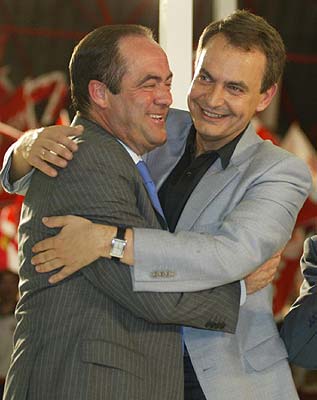So everyone in the Socialist camp is starting to get nervous. As we get closer to election day many Socialist bloggers and activists are starting to wonder if PP could actually win the general election in March. Polls show PSOE ahead by just 2.5 points at national level and people wonder if the economic slow-down, though still growing, the Catholic Church open attacks and PP's communication strategy are starting to pay off for the conservatives.
Well, let me reassure some Socialists out there. We are in a good position to still win , and possibly big, on the 9th of March.
First of all, the official campaign hasn't started yet. We have two presidential debates, where voters will be able to compare Zapatero to Rajoy directly. It isn't a surprise Zapatero offered the debate and Rajoy was reluctant about accepting the challenge. In terms of personal ratings Rajoy's are the lowest in the history of Spanish democracy since 1978. On the other side Zapatero's are on a healty 58%, higher than Aznar's in 2000 when he won with absolute majority and similar to the golden years of the charismatic Felipe Gonzalez in the 1980s.
Secondly, voters before election day tend to criticise the Government for its failures and tend to overlook its achievements, that greatly outnumber the former. The important thing is that on election day the option will be a good Zapatero Government that has produced high economic growth, high employment figures, new social rights and has raised pensions and the minimum wage or a Rajoy opposition based on disloyalty on counterterrorist policy, demagogy in the territorial debate and no substance in anything thar really matters to voters. When it gets to March 9 voters will have to choose between Zapatero's positive vision or Rajoy's catastrophism.
El Pais and other outlets within the Prisa media group seem to have distanced themselves from PSOE. I will say that they are letting PSOE know that their support isn't for free, which is the right position, no Socialst government should be complacent with its achievements. But eventually PRISA won't let PP win without a fight, they are just making sure PSOE understand that the battle isn't yet won and that a tough fight should be put up. The communication war has been won by PP so far, but PSOE has a successful term and great candidates up to hit back on the prestige card.
I have been looking at the electoral map for a while now and hope for a great landslide is there. Firstly, Madrid, Rajoy's popularity there is lower than his national average, which means he most probably won't replicate Gallardon and Aguirre's landlsides there in the local elections. Murcia, with the latest corruption cases many in the rural areas could go PSOE this time around, it is doubtful, but we only need 6.000 votes to bring home the extra Congress seat allocated this time around, that would mean PP 6 seats and PSOE 4, not bad for a region politically monopolised by PP. In Valencia, again it's Rajoy who presents himself as candidate. Rita Barbera, Valencia's Mayor, has already announced she doesn't want to be candidate, which hurts PP's list there. Furthermore, Valencia is one of the regions where IU, United Left, gets one of their five seats nationally, so there is a strong left-wing minority there. Finally, Castilla y Leon, a moderate conservative region enjoys the fact that Zapatero is from Leon and the high-speed train has arrived to Segovia and Valladolid, many will be happy to change their vote in a region famously neglected previously. In the PSOE camp on the other hand, Catalonia might be upset about transport disruptions, but would they let anti-Catalanist PP win? if the election gets to close they will come out to vote for PSOE. In the nationalist regions, Galicia, Basque Country and Catalonia, PSOE has defended nationalists' right to express their believes against PP's Spanish centralism, many that voted nationalists in regional elections will go PSOE at national level just to stop Rajoy from winning.
To all Socialist supporters out there I will say come down. We have been united for four years against the demagogic attacks by PP. PP got no programme for government and a leader without any charisma whatsoever. The economic situation benefits them now? yes it does, but Pedro Solbes is our economic heavy-weight, where is theirs?. Our team, ideas and candidate are better. When the campaign officially starts the PSOE machine will roll into battle with all its assets intact. PP has spent four years creating chaos because it helps them to avoid policy, but when it comes to campaigning policy offers and an able team are what counts to the electorate, we got both and PP got none. You will see, we will be better off than it seems today.











